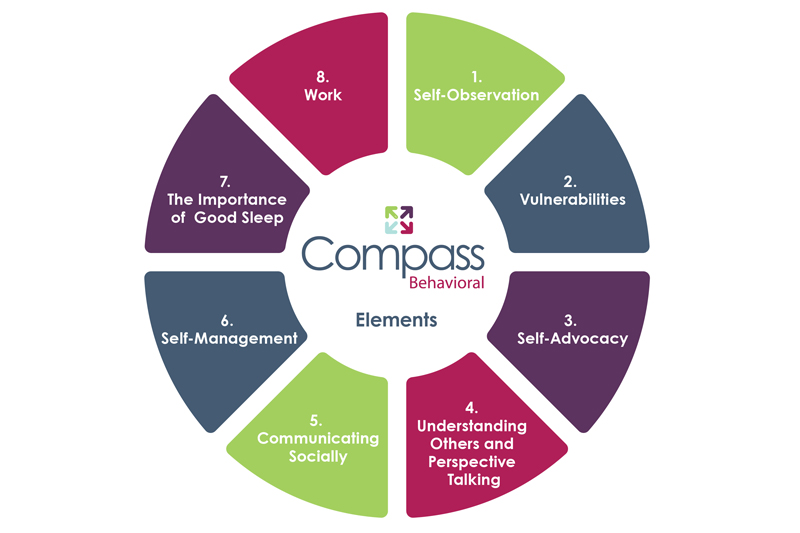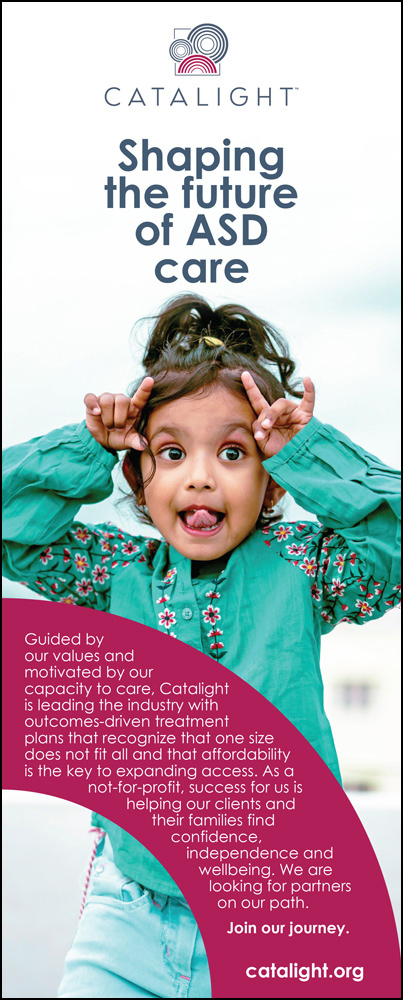In an industry where a one-size-fits-all approach to treatment is too often the norm, Catalight’s new Compass Behavioral program teaches neurodivergent teens and young adults life skills that are important to them and their idea of future success. The innovative treatment option truly places the client in the driver’s seat by giving them the ability to guide their own journey toward greater wellbeing and into adulthood.
Compass Behavioral, or Compass B for short, is a life coaching experience designed with flexibility and personal choice built into its core. For many neurodivergent individuals, particularly those with autism who do not have significant intellectual disabilities, traditional approaches can feel restrictive or ill-suited to their unique needs. Compass B is different. It was created on the principle that individuals thrive when they are empowered to set and pursue their own goals.
As part of Catalight’s innovative suite of treatment modalities, Compass B provides clients with a manual with tips on how to improve executive functioning and social skills. From the manual, the client chooses goals to focus on with the help of a licensed clinician, who they usually meet with for an hour a week for three to six months.
As a non-profit, Catalight primarily supports children with intellectual and developmental disabilities. We created Compass B after receiving referrals for a number of autistic individuals who didn’t need the rigorous structure of applied behavioral analysis or psychotherapy. They just needed some coaching to learn new skills that they wanted to learn.
We started Compass B in April 2023 as a pilot within our network of providers and clients. More than 200 participants provided valuable feedback that helped refine the program. What started as a concept aimed at filling a gap in services evolved into a proven model for individualized, client-centered care. In presenting the program findings at various conferences, we heard from many BCBAs interested in learning how they can provide Compass B to their clients.
In response, this month, we launched web-based training via Catalight Classroom for practitioners beyond our network who would like to learn Compass B. With this expansion, more people will now have access to this transformative approach.
In focusing on what truly matters to them, clients work with behavioral health experts on skills including self-advocacy, social abilities, making new friends, understanding social cues, understanding emotions, task initiation, flexible thinking, self-awareness, and even getting better sleep. The self-directed approach is not about altering who someone is but about helping them achieve what they want for themselves.
Imagine a young adult preparing for their first job interview. Unlike many neurotypical youth and young adults, most autistic young people don’t have summer jobs or intern experience. Through Compass B’s newest section about job hunting, they can work with their coach to develop specific skills tailored to the task, like effective communication and self-presentation, all while maintaining their own sense of identity and autonomy. The program also addresses crucial life skills, from planning and organization to self-management, in a personalized way that’s practical to everyday scenarios.
While the program is short, the lessons are everlasting and important for any young adult launching themselves into the real world. Clients are taught to be self-reflective, intrinsic thinkers – better understanding their behaviors and the behaviors of others in order to identify cause and effect in the future, thus further learning what to do and not to do in particular situations. In a short time, they, in essence, learn to become their own coach.
As clients work on their chosen skills, the overarching goal is to see significant improvements in their overall wellbeing. It’s not just about hitting targets or achieving specific outcomes. The program uses Catalight’s Wellbeing Scales to measure progress – a one-of-a-kind industry gauge validated by statistical analysis that monitors a person’s happiness and life satisfaction through surveys. In the Compass B pilot, clients consistently – and excitingly – reported improvements in their overall sense of wellbeing, regardless of the specific elements they chose to work on. Just seven people of the more than 200 participants dropped out.
Compass B embodies personalized care for neurodivergent individuals. It stands as a testament to the idea that when people are given the tools and support to steer their own course, they not only meet their goals but also experience a profound sense of personal growth and fulfillment. Catalight’s initiative is a step toward a more inclusive approach to behavioral health. We’re very much looking forward to this introduction to a broader audience and, ultimately, helping more people find their path to wellbeing.
Doreen Samelson, EdD, MSCP, is the Chief Clinical Officer of Catalight, a non-profit that provides access to innovative, individualized care services, clinical research, and advocacy — so people with developmental disabilities can choose their path. Samelson leads the organization’s behavioral health research team, focusing on promoting families’ overall well-being.






